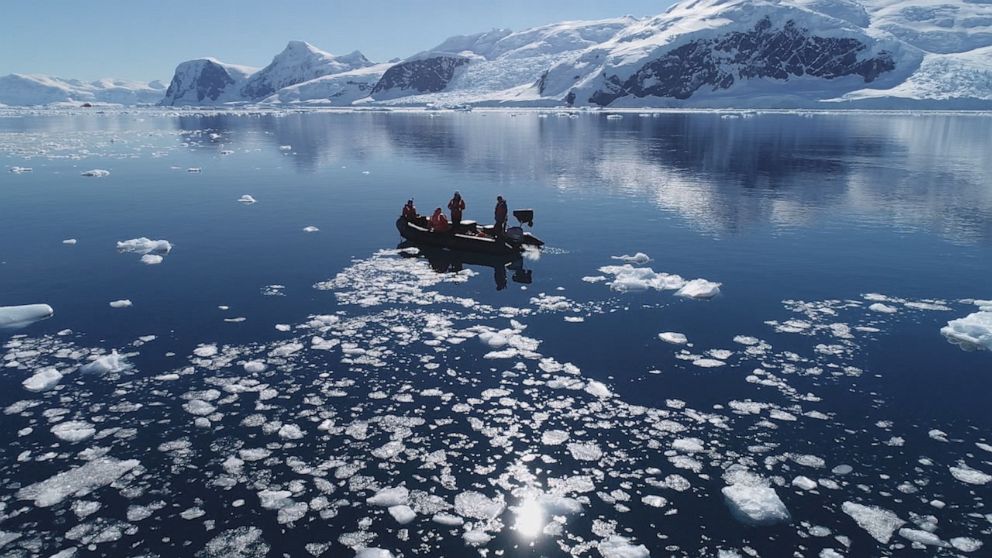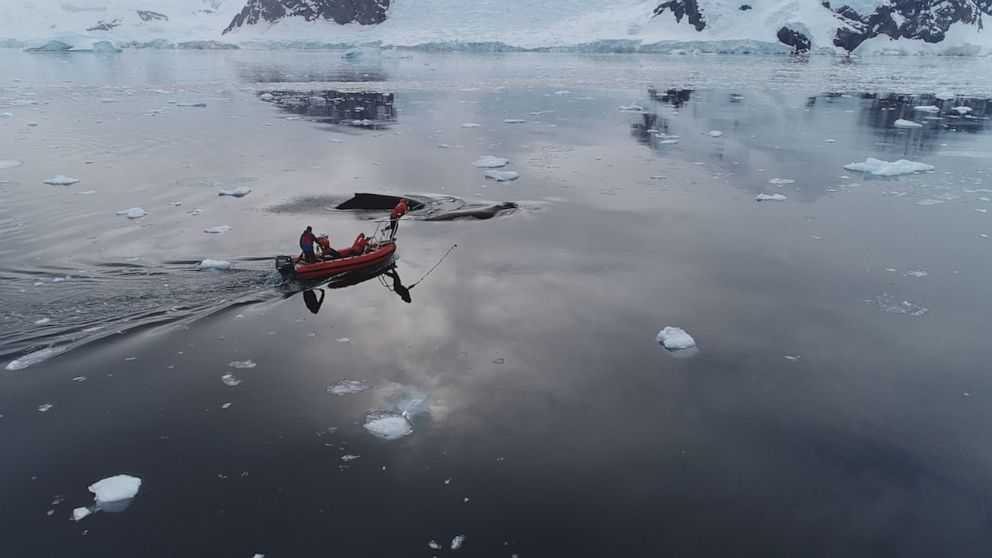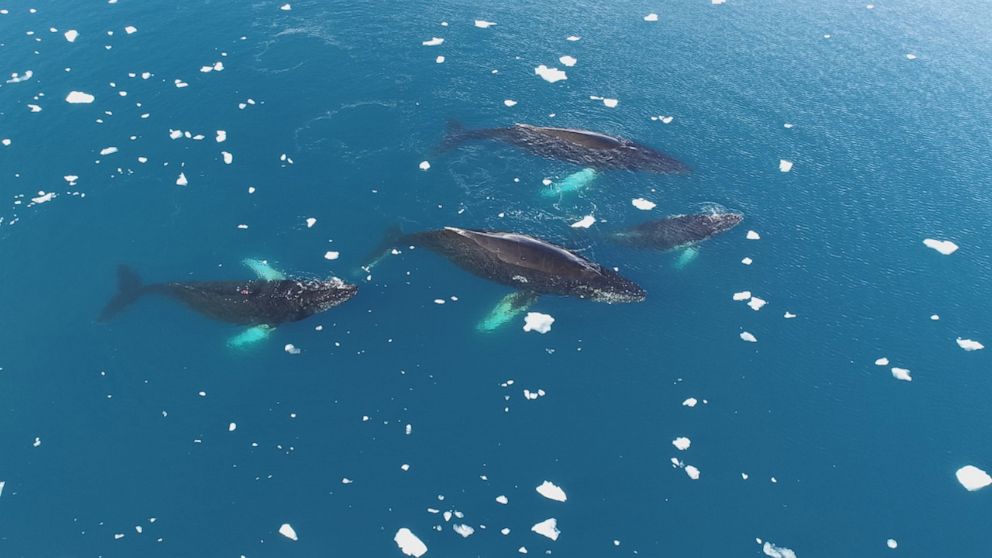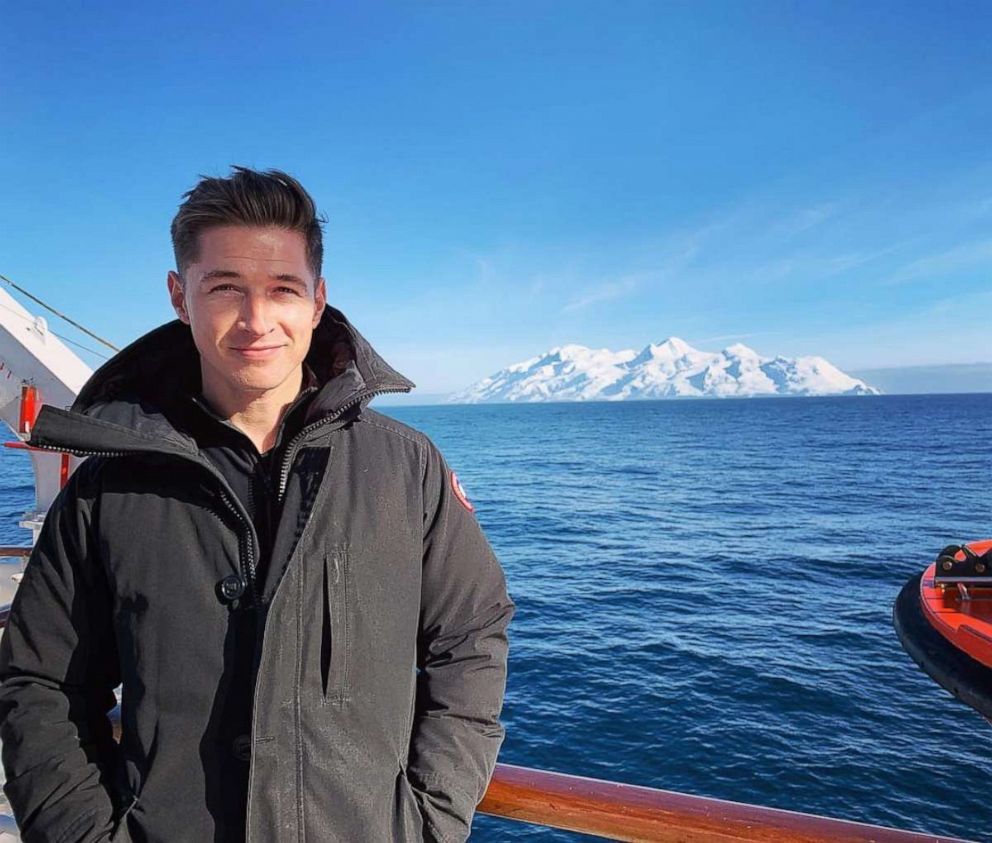Tagging humpback whales in Antarctica 'felt like a story of survival for all of us': Reporter's notebook
ABC News' James Longman reports on scientists' conservation efforts.
Antarctica -- Eight layers. Thermals, more thermals, inner layers, outer layers, and waterproofs. I do not do well in the cold.
Now, all these clothes do limit your movement slightly; for much of my time in them it felt as though I was wearing a fat suit. But that doesn't matter -- all you really need for Antarctica are your eyes.
Our trip to the world's wildest continent -- and without a doubt the most beautiful place I've ever been -- began in Ushuaia, the once-sleepy fishing village at the southern-most tip of Argentina.
We set sail for 2 1/2 days across the treacherous Drake Passage on a One Ocean Expedition ship to see climate change in action over a ten-day trip. We went to track humpback whales and other animals to see what their behaviors could tell us about the health of the oceans. A team of scientists from Duke University and the World Wildlife Fund invited us along to see their work.

The moment the continent came into view was a breathtaking one, as huge white mountains thrust up into the blue sky. The air felt so pure, when I drew a breath it felt as though it passed all around my body. We saw orca whales breaching around us, penguins and seals lying on detached pieces of ice. For all the places I've been in my work, this was a definite pinch-me moment.
Our first landing on Antarctica was eventful -- right in the middle of a snow storm. But that didn't dim the excitement of landing on my seventh continent. This is a piece of land nearly twice the size of Australia, where there are only as many as 3,000 people at any one time. I felt very small.
With bad weather plaguing our progress, the ship navigated into smaller bays, from where we jumped into Zodiac speedboats to go and spot the wildlife. And this was where the trip came alive.
The sky and sea were both silver, and as we glided along the mercury-like water it was as though we were flying. The afternoon sun gave the scene an orange tint, and there was nothing there but us.
No other name would suit Paradise Cove, and our afternoon spotting humpback whales. Gentoo penguins -- the fastest of their species -- blasted out of the water alongside our boat like black and white bullets.
We came right up alongside the giant humpbacks as they bobbed peacefully in the still water. The scientists' aim was to tag as many of the whales as possible, to take samples, and to monitor their feeding patterns. When you are next to these incredible creatures, you see their fin and part of their back -- but as they dip to go underwater and pass under the boat, you see the whole animal. And they are magnificent. There is a grace to them that you wouldn't have thought possible in an animal that size.

For the humpback whale at least, things are looking good -- for now. Because of the ban on whaling and the restrictions put on fisheries, their numbers have boomed. Humpbacks now exist in every ocean on earth; those in the Antarctic travel from the tropics to feed throughout the winter, and then return to warmer water to mate.
But the warning from scientists couldn't be clearer: The food on which they rely is in danger. Antarctic krill are the bedrock of the ecosystem here. Whales, birds, fish -- all of them rely on these shrimp-like creatures to exist. But a warming ocean will kill them off.

Across the Antarctic Peninsula, the sea-ice season has shrunk by more than three months a year over the last 40 years, and 87% of the glaciers here are receding because of an ocean that's warming faster than anywhere else on earth.
A warming climate is only part of the battle here, as a once pristine landscape is slowly feeling the direct impact of man. From the samples the team takes off the whales, the discoveries are shocking. Plastics, heavy metals -- even flame retardants have all been found inside whales here.
The scientists we are with are the latest generation in a long line of adventurers who have not just made saving Antarctica their life's work, but who have sought to show the world what insights learned here can tell us about the rest of our planet -- and the places where we live.
We saw, for example, the lab where the hole in the earth's ozone was discovered in 1985. Since then, there has been a concerted effort to close it through the banning of aerosols and other harmful chemicals.
Scientists were believed, and politicians acted.
The debate over climate change, then, seems to be strange one, where those same scientists are now accused of political motivations.
It was certainly an honor to see Antarctica. But amid all the finery of a ship that wouldn’t look out of place in the Caribbean, I couldn’t help wonder if there wasn’t a strange contradiction at play; if tourists hungry for their next adventure and keen on marveling at Antarctica's spotless scenery wouldn’t in the end destroy the one unique feature of this place -- its lack of humans.

Perhaps careful tourism is worth it, if only to give people the chance to learn about the dangers that lie ahead.
For me at least, so much of my work as a reporter frames issues as life or death. They are often serious, of course.
But for the first time, this felt like a story of survival for all of us.




